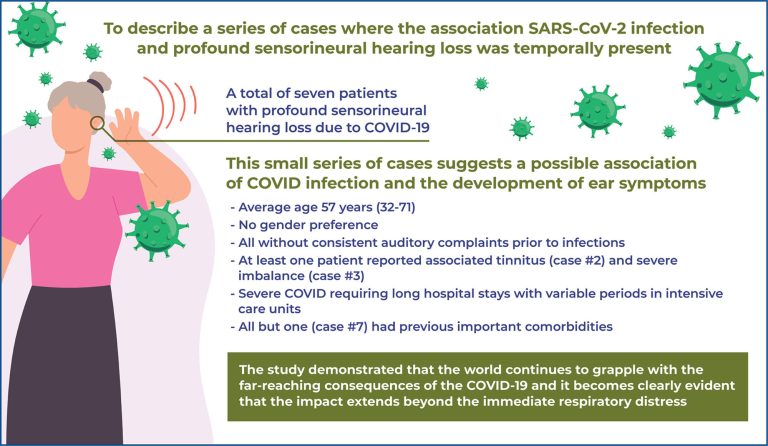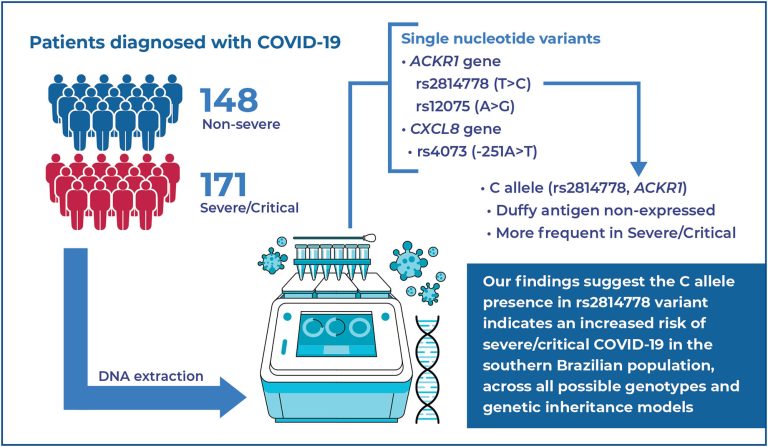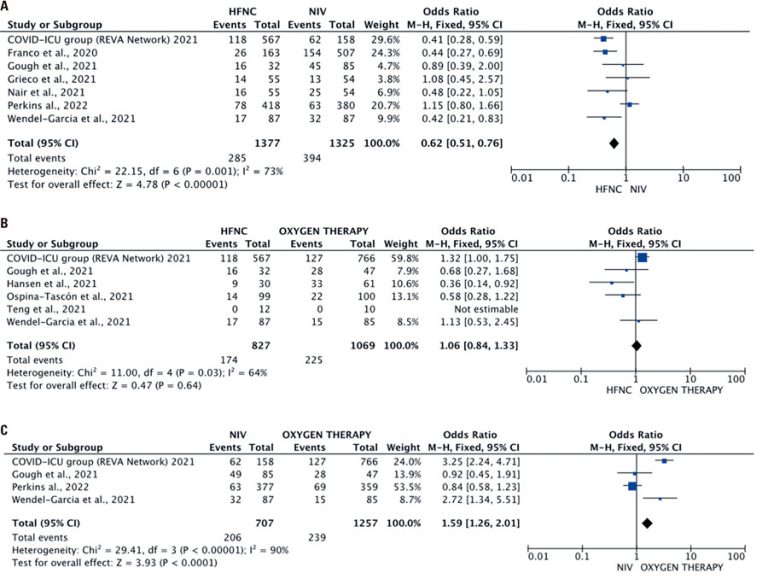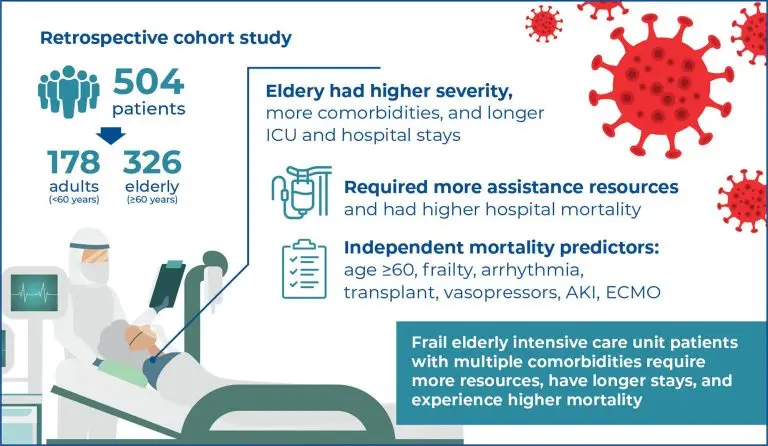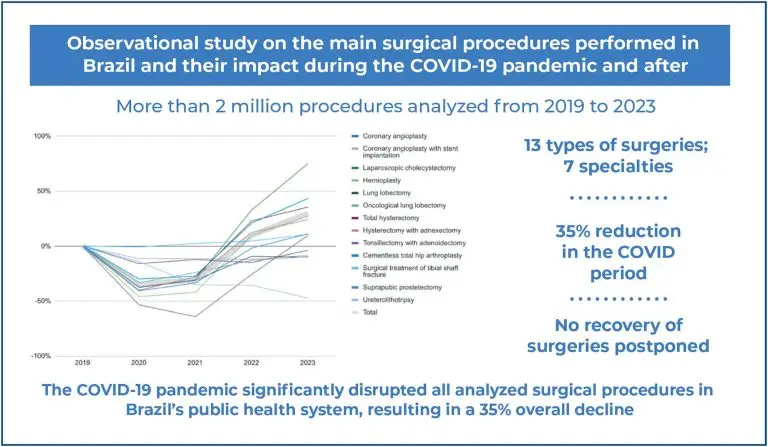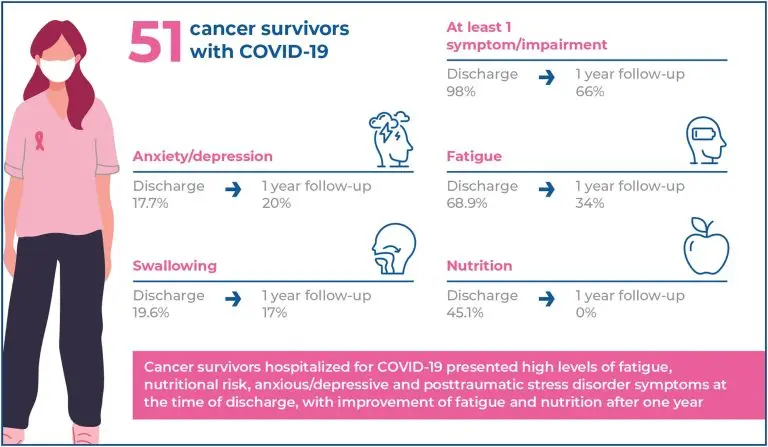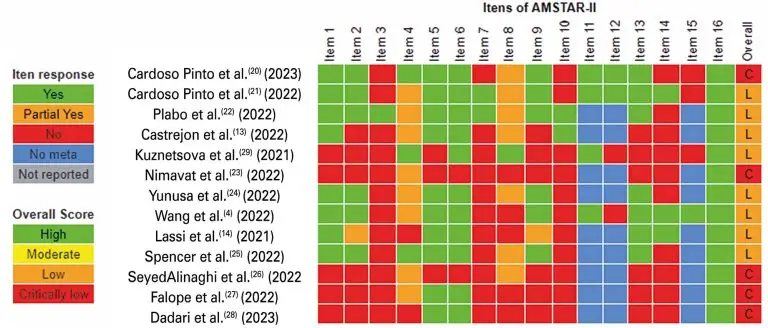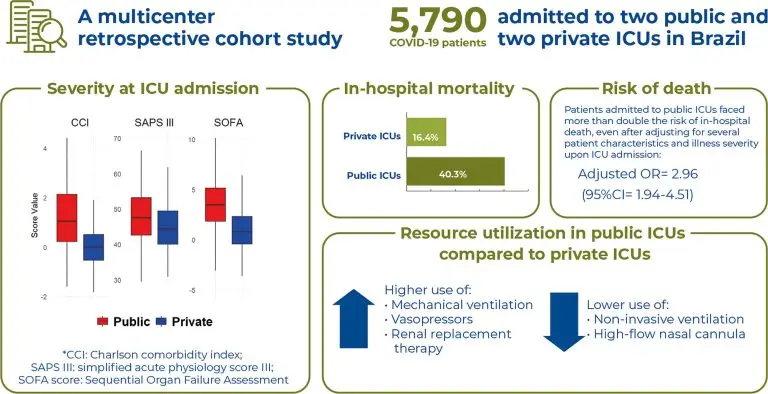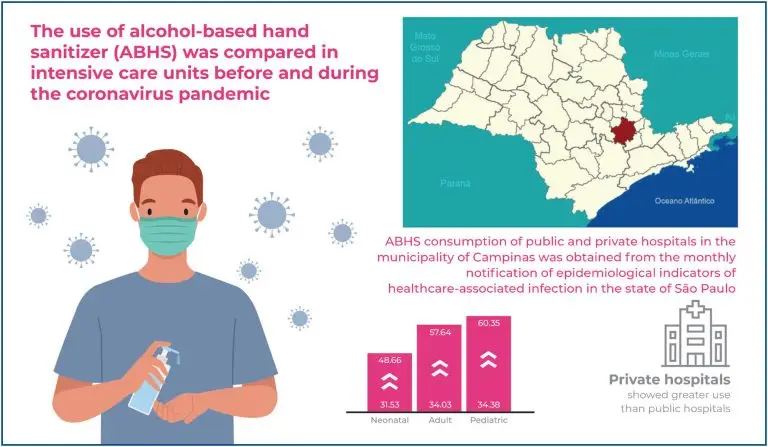03/Feb/2026
SARS-CoV-2 infection and profound hearing loss: much more than a coincidence
DOI: 10.31744/einstein_journal/2026AO1126
Highlights ■ This study describes a series of cases in which SARS-CoV-2 infection is associated with profound sensorineural hearing loss. ■ COVID-19 infections can indeed cause sensorineural hearing loss. ■ Seven patients with profound sensorineural hearing loss due to COVID-19 were clinically evaluated and underwent audiological testing. ■ This study highlights that the consequences of COVID-19 extend beyond respiratory symptoms and affect other systems, such as the inner ear. ABSTRACT Objective: To describe a series of cases in which severe […]
Keywords: Cochlear implants; COVID-19; Hearing loss, sensorineural; Hearing tests; Quality of life
17/Dec/2025
Association of the rs2814778 variant in the ACKR1 gene, responsible for the Duffy erythrocyte antigen “null” phenotype, with COVID-19 severity in Southern Brazil
einstein (São Paulo). 17/Dec/2025;24:eAO1543.
View Article17/Dec/2025
Association of the rs2814778 variant in the ACKR1 gene, responsible for the Duffy erythrocyte antigen “null” phenotype, with COVID-19 severity in Southern Brazil
DOI: 10.31744/einstein_journal/2026AO1543
Highlights ■ The rs2814778 C allele is linked to severe/critical COVID-19. ■ The association is independent of major clinical risk factors. ■ The Duffy “null” phenotype may promote lung inflammation. ■ rs12075 and rs4073 showed no association with COVID-19 severity. ABSTRACT Objective: This study aimed to analyze the possible association between rs2814778, rs12075 (ACKR1 gene), and rs4073 (CXCL8 gene) single nucleotide variants and COVID-19 severity. Methods: This cross-sectional study included 319 COVID-19 diagnosed patients at two hospitals in Paraná, Brazil […]
Keywords: ACKR1 protein, human; Coronavirus; COVID-19; Duffy blood-group system; Polymorphism, single nucleotide; SARS-CoV-2
17/Dec/2025
Effect of non-invasive ventilation and high-flow nasal cannula on hospital mortality in COVID-19-induced acute respiratory failure: a meta-analysis
einstein (São Paulo). 17/Dec/2025;24:eRW0695.
View Article17/Dec/2025
Effect of non-invasive ventilation and high-flow nasal cannula on hospital mortality in COVID-19-induced acute respiratory failure: a meta-analysis
DOI: 10.31744/einstein_journal/2026RW0695
ABSTRACT Background Non-invasive respiratory support strategies, such as high-flow nasal cannula therapy and non-invasive ventilation, were widely employed during the coronavirus disease 2019 (COVID-19) pandemic, yet their comparative effectiveness remains uncertain. Objective To compare the effects of high-flow nasal cannula therapy, non-invasive ventilation, and conventional oxygen therapy on intubation rates and hospital mortality in adults with COVID-19-related acute respiratory failure. Methods A systematic review and meta-analysis was conducted following PRISMA and Cochrane guidelines, with searches performed in nine databases for […]
Keywords: COVID-19; Intubation; Mortality; Noninvasive ventilation; Oxygen inhalation therapy; Respiratory insufficiency; SARS-CoV-2
17/Dec/2025
Scientific breakthroughs in the COVID-19 era: embracing Ernst Mayr towards an epistemic renewal of Medicine
DOI: 10.31744/einstein_journal/2026RW1785
ABSTRACT The present study examines the development of medical science during the COVID-19 pandemic in light of Ernst Mayr’s critique of Thomas Kuhn’s philosophy of scientific revolutions. Kuhn’s model, which emphasizes paradigm shifts and disruptive changes in scientific practice, contrasts with the evolutionary and cumulative nature of biological sciences, as argued by Mayr. Revisiting Mayr’s critique, we question the applicability of Kuhn’s model to the COVID-19 pandemic by using vaccine development as a case study. We argue that the rapid […]
Keywords: Coronavirus infections; COVID-19; Knowledge; Philosophy; Science; Vaccines
28/Aug/2025
Elderly patients in crisis: unveiling outcomes and management approaches in severe COVID-19 cases – a retrospective analysis from Brazil
einstein (São Paulo). 28/Aug/2025;23:eAO1428.
View Article28/Aug/2025
Elderly patients in crisis: unveiling outcomes and management approaches in severe COVID-19 cases – a retrospective analysis from Brazil
DOI: 10.31744/einstein_journal/2025AO1428
Highlights ■ The elderly had higher severity, more comorbidities, and longer intensive care unit and hospital stays than adults. ■ They required more assistance resources and had higher hospital mortality. ■ Independent mortality predictors: age ≥60, frailty, arrhythmia, transplant, acute kidney injury, vasopressors and extracorporeal membrane oxygenation. ABSTRACT Objective: To analyze the sociodemographic and clinical characteristics, comorbidities, therapeutic resources, and mortality rates of elderly patients with COVID-19 admitted to an intensive care unit. Methods: This retrospective cohort study included patients […]
Keywords: Acute kidney injury; Aged; COVID-19; Critical care outcomes; Hospital mortality; Intensive care units; Length of stay; Mortality
19/Aug/2025
What happened to the most frequent surgeries performed in the Brazilian Unified Health System during and after the COVID-19 pandemic? An analysis of 2 million procedures
einstein (São Paulo). 19/Aug/2025;23:eAO1399.
View Article19/Aug/2025
What happened to the most frequent surgeries performed in the Brazilian Unified Health System during and after the COVID-19 pandemic? An analysis of 2 million procedures
DOI: 10.31744/einstein_journal/2025AO1399
Highlights ■ More than 2 million procedures were analyzed in the public health system from 2019 to 2023. ■ A total of 13 types of procedures were performed across 7 different specialties. ■ A 35% reduction in the total number of surgeries was observed. ■ There was no recovery of surgeries postponed during the pandemic. ABSTRACT Objective: To analyze changes in surgical volume across different specialties in Brazil before, during, and after the COVID-19 pandemic. Methods: This descriptive observational study […]
Keywords: Brazil; Brazilian Unified Health System; COVID-19; Health Information Management; Health services needs and demand; Pandemics; Public health; Surgical procedures, operative
13/Aug/2025
A prospective and longitudinal cohort study assessing postacute sequelae of SARS-CoV-2 infection in patients with cancer
einstein (São Paulo). 13/Aug/2025;23:eAO1139.
View Article13/Aug/2025
A prospective and longitudinal cohort study assessing postacute sequelae of SARS-CoV-2 infection in patients with cancer
DOI: 10.31744/einstein_journal/2025AO1139
Highlights High fatigue and nutritional risk at discharge improved over one year in cancer survivors. Psychological symptoms, such as anxiety, depression, and posttraumatic stress disorder, remained prevalent for one year. 66% of patients had lasting symptoms or impairments after 12 months of follow-up. Nutritional risk was resolved in the following year. ABSTRACT Objective: Post-COVID symptoms are frequent and can be debilitating, particularly in individuals with cancer. However, their impact on this population remains unclear. This study aimed to prospectively assess […]
Keywords: Activities of Daily Living; Anxiet; Coronavirus infections; COVID-19; Depression; Fatigue; Hospitalization; Intensive care units; Neoplasms; Patient discharge; Post-acute COVID-19 syndrome; SARS-CoV-2; Stress disorders, post-traumatic; Symptom assessment
14/Mar/2025
How the COVID-19 pandemic affected routine child vaccination: an integrative review
DOI: 10.31744/einstein_journal/2025RW1119
ABSTRACT Background Child immunization plays a critical role in preventing numerous diseases. However, the COVID-19) pandemic has profoundly disrupted healthcare systems globally, including routine child vaccination programs. Objective To provide an overview of the reduction in vaccine coverage among infants and children during the pandemic and analyze the potential impacts of decreased child immunization during this period. Methods A comprehensive search was conducted using the MeSH terms “Child,” “Vaccination”, and “COVID-19,” along with their synonyms. Systematic reviews published between March […]
Keywords: Child; Child health; COVID-19; Immunization; Immunization schedule; Infant, Newborn; Pandemics; Vaccination; Vaccination coverage; Vaccines
14/Mar/2025
Assessment of mortality due to severe SARS-CoV-2 infection in public and private intensive care units in Brazil: a multicenter retrospective cohort study
einstein (São Paulo). 14/Mar/2025;23(spe1):eAO1060.
View Article14/Mar/2025
Assessment of mortality due to severe SARS-CoV-2 infection in public and private intensive care units in Brazil: a multicenter retrospective cohort study
DOI: 10.31744/einstein_journal/2025AO1060
Highlights ■ Public intensive care unit COVID-19 patients presented with more comorbidities and higher severity at admission. ■ Public intensive care units required more invasive organ support (e.g., mechanical ventilation, vasopressors, and renal replacement therapy) but less non-invasive ventilation and high-flow nasal cannula than private intensive care units. ■ In-hospital mortality was higher in public intensive care units, with an increased risk of death even after adjusting for patient characteristics and illness severity at intensive care unit admission. ABSTRACT Objective: […]
Keywords: Coronavirus; Coronavirus infections; COVID-19; Critical care; Critical care outcomes; Intensive care units; Mortality; SARS-CoV-2
24/Jan/2025
Hand hygiene adherence in intensive care units: comparison before and during the COVID-19 pandemic in a municipality of São Paulo state
einstein (São Paulo). 24/Jan/2025;23:eAO0951.
View Article24/Jan/2025
Hand hygiene adherence in intensive care units: comparison before and during the COVID-19 pandemic in a municipality of São Paulo state
DOI: 10.31744/einstein_journal/2025AO0951
Highlights ■ The COVID-19 pandemic has increased adherence to hand hygiene in intensive care units. ■ Private hospitals recorded higher consumption of alcoholbased hand sanitizer. ■ Interventions are needed to help keep rates up. ABSTRACT Objective: Compare alcohol-based hand sanitizer use in intensive care units in a municipality in São Paulo state, before and during the coronavirus pandemic. Methods: Analytical retrospective study using indirect documentation, with data obtained from a notification spreadsheet for epidemiological indicators of healthcare-associated infection in the […]
Keywords: Coronavirus infections; COVID-19; Hand hygiene; Hand sanitizers; Intensive care units; Pandemics; Risk reduction behavior


